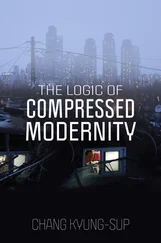“Unlock the doors,” she said weakly.
“It’s okay, Mrs. Singer. We’ll be moving on now.”
“Please do it!”
The power locks jumped and she practically leaped out of the car, stumbling a few feet away from the door and falling on one knee in a weedy patch of the shoulder. She vomited very little, just the small mug of roasted barley tea she’d made herself before Clines picked her up, her spit tasting metallic and bilious; she was glad it was dark enough that she couldn’t make out the blood in the grass. She’d begun flushing the toilet at her shop with her eyes closed after she got sick in it, simply to avoid that wash of bright, wild color.
“You’re not well enough for this, Mrs. Singer,” Clines said, helping her to her feet. “Let me take you back to your shop now.”
“No,” she said firmly, but then had to lean into him to steady herself. His clothes smelled strongly of mildew and breath mints and she couldn’t help but gag and heave again, though there was nothing left in her to come out. She wiped the spittle from the corners of her mouth.
“We’re not going back yet, do you hear me?”
He nodded and helped her back into the car. He still seemed unsettled from the near accident and perhaps from her vehemence, too, and when they passed a diner she told him to turn around and he didn’t even ask why. Once he parked she asked him to leave her in the car for a while and go inside and have a coffee, and when he said he was fine she was sharp-voiced again and he sullenly trooped inside and sat on a stool at the counter.
She waited for him to order from the waitress before taking out a small black kit from her purse. Inside were the syringes and cotton balls and vials of alcohol and morphine that she’d received from Koenig’s resident. The needle was short and tiny, as fine as a filament, the kind diabetics and addicts used, but it was important, the resident said, to insert and pull it straight out, to avoid bruising or causing herself more pain than necessary. But now, on her own, in this condition, her hands shook with the screeching pains in her lower back and belly and she could hardly unscrew the bottle of disinfectant, and then jabbed her finger trying to push the point through the rubber cap of the morphine vial. She gave up, simply chewing two more bitter pills instead; she gagged on them but forced herself to keep them down. She tossed the needle into the kit; its dwarf scale somehow scared her. She was afraid that if she kept trying, one of her visions would appear along with it, that child in a perfectly sized doctor’s white coat whose mouth was too gaping and wide for his shrunken old-young face. Was it Nicholas? Was it her brother, Ji-Young? Koenig had warned her that she might experience hallucinations, and this one and others were accruing to her of late, apparitions that said little or nothing and seemed only to be awaiting her. She found herself speaking half-sentences to them, faint mutterings, beseeching them in a kindly, almost sycophantic tone she had never used for anyone, hoping that they might not wrench her away.
Please let me find him first , is what she said now, her head drifting down as she lay across the backseat. They were still heeding her and she believed that if she could endure their massing they might somehow forget about her, or else count her a kindred specter, let her soon join their number lingering in the ashen underworld gloom.
DORA, HE THOUGHT, was more than all right. It wasn’t yet evening and Hector had just showered and was shaving and she was in his kitchen fixing them a dinner of pan-fried blade steaks and roast potatoes, singing an old tune his mother used to croon in her throaty, impure voice but that Dora intoned like a just-born nightingale:
From this happy day,
No… more… blue… songs…
Her voice was fizzy and girlish and despite the patent optimism of lyrics that would have ordinarily made him instantly contract into a leaden die he was instead humming along with her in a dusky key. His sound wasn’t half bad. When was the last time he had let his voice be an instrument? He was raised in a family that valued singing, and he had performed, briefly, in the church choir, being one of its youngest boys. He showed enough talent to feature in a few solos and liked music well enough but in fact he was drawn just as much by the bodily practice of it, the used-up sensation he would get in his throat and chest after the hours of rehearsal, that blood-warmed exhaustion; but he had to quit it after the priest one day asked him to sing privately in the vestry, the florid-cheeked old man kneeling before him and tightly embracing his legs and whispering into his chest that he was a right gift from God. You’re magnificence , dear boy , the padre said, with tears in his eyes. You’re a thing eternal . The choir leader opened the vestry door at that moment and at the next rehearsal she made him promise not to return. After that he only went to mass with his mother, and it was the last of his singing, formal and not, this nearly fifty years past.
He wiped his face of remaining streaks of lather and dabbed on some aftershave he’d just bought himself, and combed his close-cropped hair. Dora had cut it before his shower and it seemed darker and thicker than he remembered it and with the music of her woman’s voice and the smell of real cooking it seemed he was now in a wholly different life. There were already noticeable changes in his apartment. She was good about not leaving anything obvious of hers behind, such as jewelry or clothing, after he’d made it known that he preferred her not to. And yet there were clearly indications that he was no longer living by himself; the bed was made differently in the morning, with tighter corners than he ever bothered to make; his toothbrush and toothpaste were put away inside the medicine chest; his three pairs of shoes lined up neatly beside the door; and with each night she spent, another diaphanous layer of her presence seemed to settle upon him and everything else, this fine dust of her that he could almost taste on a spoon, on the rim of a glass.
For nearly two weeks now Dora had been consorting with him and they had already gone past the point in time he would have normally nudged her on her way. She was joyful and effortlessly kind to him and like a revelation these simple facts made him joyful, too, or something close to it, and he thought he should do whatever it took to preserve the feeling. He had come to appreciate her surprisingly optimistic spirit-who at Smitty’s ever spoke of life actual years hence, about such a thing as traveling, or taking a college class at night? Even if her cheerfulness were more a late-rigged buttress than any natural, inner girding, the product of one of the self-help books she always carried in her handbag, he certainly didn’t think less of her for it. So what if she believed that advice from a book could work. So what if she held herself to a standard far beyond any possibility of attainment. Isn’t that what every normal, decent person did? Maybe she drank too much, like the rest of them, but she was dogged in pursuing her interests, this better idea of herself, paddling furiously even if she wasn’t yet getting too far.
As a girl she was accidentally shot by her stepfather during a duck hunt-he was a drinker, too, a small-town Ohio banker with a temper as unknowable as heat lightning who sometimes made visitations to Dora or her sister late at night-and she told Hector that from time to time she was sure she could still feel the pellets the surgeon had to leave undisturbed in her neck and back for fear of paralyzing her; like an echo the pain was both angular and diffuse, and she suffered it all her life, though these days she said it arrived with certain kinds of weather, with the tides and the moon, with her female cycle, which had just gone intermittent.
Читать дальше











